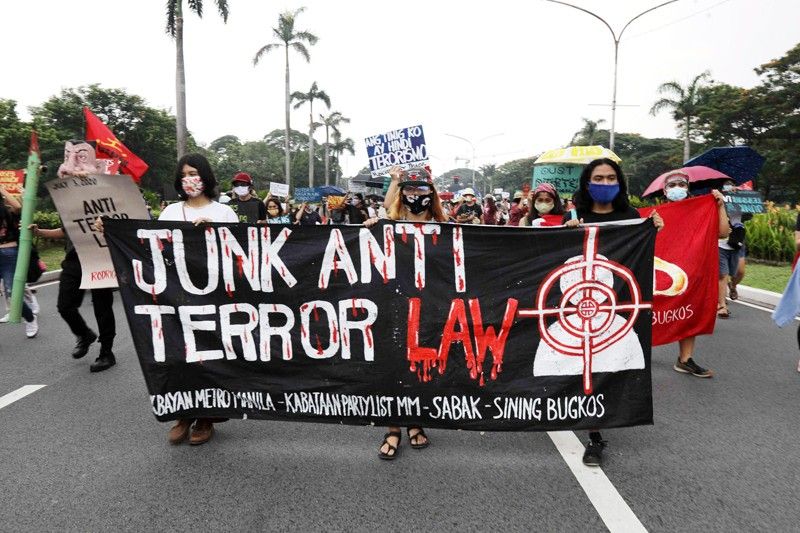Terror law faces first SC challenge

MANILA, Philippines — Less than 24 hours after its enactment into law, protests and denunciation deluged the Anti-Terror Act, with lawyers and civic groups petitioning the Supreme Court (SC) to have it trashed for being “oppressive and inconsistent” with the Constitution.
In a petition filed electronically, groups opposed to the Anti-Terror Act of 2020 asked the SC to issue a temporary restraining order and writ of preliminary injunction and other injunctive remedies to stop the implementation of the law contained in Republic Act 11479.
Some opposition lawmakers also vowed to seek the high court’s help to stop the implementation of RA 11479.
Law professor Howard Calleja led the petitioners who include lawyers Joseph Peter Calleja, UP law professor Christopher John Lao and Dr. Reynaldo Echavez, Napoleon Siongco, Raeyan Reposar, Br. Armin Luistro of the De La Salle Brothers and civic groups Tunay na Bayani and Bagong Siklab Pilipinas.
“While threats to our national security need to be addressed, the law, as crafted, is oppressive and inconsistent with our Constitution, hence, the petition. This fight against terrorism should not and should never be a threat to the fundamental freedoms of all peaceful Filipinos,” the petitioners said.
Several provisions of the law, they said, were “repugnant to the 1987 Philippine Constitution”
The petitioners said they hope to physically file the petition and publish a complete copy of it on Monday.
Justice Secretary Menardo Guevarra welcomed the filing of the petition. “The filing of this and similar petitions has been expected. This is a positive development, as it provides all parties concerned the appropriate forum for the resolution of all the legal and constitutional issues involved, with finality,” Guevarra said.
Named respondents are the Office of the Executive Secretary, national security adviser, secretary of foreign affairs, secretary of national defense, secretary of the interior and local government, secretary of finance, secretary of justice, secretary of information and technology and the executive director of the anti-money laundering council (AMLC).
“There is an urgent and paramount necessity to prevent further damages as the effectivity and implementation of the anti-terrorism act will materially and substantially prejudice basic constitutional rights and may result to the permanent contraction of civil and political liberties,” the petitioners said.
Interviewed over dzMM, Vice President Leni Robredo vowed yesterday to support efforts to block the implementation of the Anti-Terror Law.
She said turning to the SC for help to stop RA 11479 “is one of the alternatives that we see aside from returning to Congress.”
“What happened in Congress was very contentious. They made sure that the version of the House of Representatives is similar to the Senate version despite the objection of some lawmakers… That in itself is very telling that we still have a chance,” she added.
Robredo reiterated her concerns over some provisions of the new law, including the broad definition of terrorism as well as the extended detention period despite the absence of an arrest warrant issued by a judge.
“I am one with the belief that terrorism is a major problem of our country and we have to find ways to stop it,” she said.
“But what we are asking for is the assurance that there are enough safety nets on the provisions that we are concerned about,” she added, noting the timing and the process that happened at the House of Representatives.
Aside from petitioning the case before the high court, Robredo also urged the public to continue engaging with the Senate and the House of Representatives to repeal or amend the questionable provisions.
“Let us not lose hope,” she said. “Let’s remind ourselves that the power is still in the hands of the ordinary people.”
Balanga Bishop Ruperto Santos and Lingayen-Dagupan Archbishop Socrates Villegas have also expressed their dismay over the passage of the anti-terror law, saying it will terrorize the people and curtail their freedom of speech.
“This anti-terrorism will not give us peace of mind but anxiety that it will be used, even abused, for us to be accused, arrested without due process or warrant. It just makes us afraid, fearful of what will happen to us,” Santos said.
Santos said the government has crafted a measure that will threaten, control or stop dissent instead of focusing on the welfare of the Filipino people already suffering from the COVID-19 pandemic.
Villegas expressed fear the implementation of the law would be left to the reckless and the power trippers.
“With our government, we decry terror. With our government, we denounce terrorists. Unlike our government, however, we do not wish to meet violence and blind rage with heightened violence and legitimized terror,” Villegas said.
Bayan Muna Rep. Carlos Zarate and Albay Rep. Edcel Lagman said they were preparing to file a petition with the SC to stop the anti-terror law.
“We would have to continue the fight on all fronts until this terror law is junked. We will question its constitutionality at the Supreme Court at the soonest time possible,” Zarate revealed.
“We call on all freedom loving Filipinos to be very vigilant because darker days are ahead. We must remain united and report any and all violations of human rights. An attack on one is an attack on everyone. We will show them that in the face of repression an awakened people will resist and fight back,” he said.
Lagman said the new law “stifles dissent, imposes prior restraint to freedom of expression, derogates civil liberties and institutes state terrorism.”
“The new law installs national security to a high pedestal while it demotes civil liberties to a lowly footstool,” he argued.
A barrage of online and offline protests met the passage of RA 11479. At the University of the Philippines in Diliman, Quezon City, various groups staged an indignation rally yesterday to protest the passage of the controversial measure.
Like the Independence Day gathering last month, protesters aired their grievances while following physical distancing protocols.
Hashtags such as #JunkTerrorLaw also trended on Twitter on Friday night, moments after it was confirmed that President Duterte had signed the legislation despite widespread opposition from various sectors.
The Commission on Human Rights (CHR) said it would hold on to the commitment of the government and the law’s supporters and advocates that human rights would be upheld at all cost.
“The CHR has expressed its reservations about the Anti-Terrorism Act – not for its intent to curb terrorism, but on how the law puts at risk the guaranteed rights of the people,” CHR spokesperson Jacqueline de Guia said.
“Our position has been clear: CHR deplores how violence by terrorists have disregarded individual and collective rights through the destruction of properties and loss of lives. We are against terrorism. But in the pursuit of a safer nation, we cannot compromise our human rights,” she added.
The National Union of Students of the Philippines described the signing of the measure as a “shameless move in the face of a country being ravaged by a pandemic.”
“There is no terrorism in dissent, in fighting back. There is no terrorism in the legitimate calls of the people. There is only terrorism in silencing them,” it added.
The Alliance of Concerned Teachers said the law would legitimize the violation of constitutionally protected rights and liberties of the Filipino people.
“Our basic and just calls for decent pay, better benefits, safe schools, inclusive and relevant education, among others, will be labeled as terrorist demands, giving them vile justifications to further terrorize our schools and communities,” said the teachers’ group.
“The more than two months of the militaristic lockdown in large parts of the country is a preview of what’s to come should President Duterte and his cohorts succeed in installing and effecting this measure,” it added.
Children’s rights organization Salinlahi said the new law would only lead to more and intensified state-sanctioned human rights violations.
“Despite its supposed objectives, the measure will only embolden state terrorism and disregard constitutionally guaranteed rights of its citizens, particularly its vocal critics,” it said.
- Latest
- Trending




























